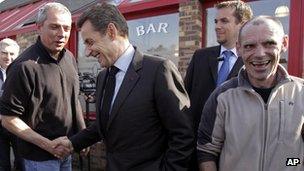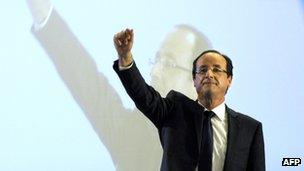French presidential election: 'A beginning not an end'
- Published
- comments

Nicolas Sarkozy will need to appeal to right-wing voters if he is to have a chance of winning the run-off.
The French presidential election is far from settled. Francois Hollande is the favourite, but much can happen over the next two weeks. His lead over President Sarkozy was narrow.
The socialist candidate has one immediate advantage. The far left - represented by Jean-Luc Melenchon - has pledged its support to Mr Hollande.
President Sarkozy cannot, however, depend on the votes of the far right.
Marine Le Pen's vote at 19% exceeded all expectations. Her votes may well determine who wins the second round.
Last week at a Le Pen rally there were boos every time Sarkozy's name was mentioned. He is regarded by many on the right as a betrayer, a man who says one thing on the hustings and another when in office.
Leaning right
So will Nicolas Sarkozy go hunting those far-right voters? The fact is that he won't be re-elected without some of their votes.
He said the results show the importance of controlling immigration and saving jobs. Whereas Francois Hollande can tack to the centre, President Sarkozy must appeal to the right.
The first part of Sarkozy's speech after the vote touched on all the right-wing themes of identity, security, immigration and, as he put it, "the concern of our compatriots to preserve our way of life".
However determined President Sarkozy may be to fight on, he was rejected by a majority of the French people. A sitting president barely won a quarter of the vote.
"It's the first time that a former president is not leading the score," said Laurent Fabius, a former prime minister.
The first round result revealed a dissatisfaction and restlessness in France. The elites are despised. The economic future is feared. There is insecurity. All of that leads to volatility in the polls.
This result reveals yet again how the eurozone crisis continues to threaten incumbents. Nearly a fifth of voters backed a party that wants to ditch the euro and return to the franc.
No to Europe

Francois Hollande came out of the first round on top, but his victory was narrow
Both the far left and the far right tapped into a deep disillusionment with globalisation and European institutions.
Hollande tries to surf this mood but understands how dangerous it is. He had this message - particularly for Berlin - that he wants to "re-orientate Europe on a path of growth and employment".
President Sarkozy cannot retain the presidency by just appealing to the right. He must attack the credibility of his opponent.
That is why he has challenged Francois Hollande to three TV debates. He believes that in a face-to-face argument he can expose the socialist economic programme as dangerous for France.
With a Hollande victory in prospect, it will be interesting to see what the markets do in the next two weeks and whether France's borrowing costs edge higher.
Marine Le Pen will now be a significant force in French politics.
She said the "first round isn't the end but the beginning of a vast coming-together of patriots of the right and the left, and the defenders of its identity, the lovers of what makes the French exceptional".